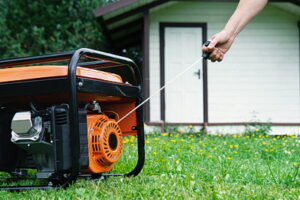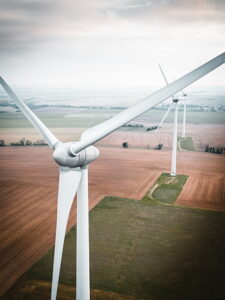What are Electric Generators?

Electric generators are the opposite of electric motors, but they work on the same concept. Whereby an electric motor uses an electric current to create a magnetic field, a generator uses a magnetic field to induce an electric current. If you read our article on electric motors, then this should sound very familiar. The process is only reversed.
The current that is produced flows through a conductor which is usually a wire, but it can also be a metal plate. The output of the current is then used to power anything from a small device (e.g. a lamp or computer) to an entire town or city.
What They are Used For
Generators are used to create electricity which then powers homes and businesses. They can be powered by either an electromagnet or a permanent magnet. The type of generator you use will determine how much electricity you can generate.
They are often used to provide backup power in case of a power outage, and they are also used in many portable applications such as camping and RVing. Just about all emergency facilities have backup power, such as hospitals.
In some cases, generators can also be used to supplement the main power source, providing additional power during high-demand periods.
The most common power sources are fuels such as coal, natural gas, or oil.
How Does an Electric Generator Create Energy?
When the generator is turned on, its moving parts create a magnetic field, producing an electric current. (Remember with electric motors, an electric current is produced that provides a magnetic field. This is the opposite of what generators do.) The current flows through wires to an external circuit, where it can be used to power electric devices. In this way, an electric generator converts mechanical energy into electrical energy.
What are the different types of electric generators available on the market today?
The most common type uses a combustion engine to generate electricity. These engines can be powered by gasoline, diesel, natural gas, or propane.
Another type is the steam turbine, which uses steam to power a turbine that generates electricity. Steam turbines can be powered by coal, nuclear reactors, or solar thermal power plants.
The third type of generator is the hydroelectric generator, which uses water to power a turbine that generates electricity. Hydroelectric generators can be powered by waterfalls, dams, or river currents. The Niagara Project is a perfect example of the delivery of electricity via hydroelectric generators.

The fourth type of generator is the wind turbine, which uses wind to power a turbine that generates electricity, but there must be enough wind for the proper amount of electricity to be produced.
Wind turbines can be used in both onshore and offshore locations.
How Can You Choose the Right Electric Generator for Your Needs and Budget?
With so many different brands, models, and features to choose from, it’s hard to know where to start. However, by considering a few factors, you can narrow down your options and find the perfect generator for your needs and budget.
First, decide what type of generator you need. For example, if you only need power for occasional use, such as during a power outage, a portable generator may be sufficient.
However, if you need a constant supply of electricity, such as for a construction site or an RV, a stationary generator would be a better choice.
Next, consider how much power you will need. For most applications, a small generator that produces around 2,000 watts will suffice.
However, if you need to run large appliances or multiple devices at once, you’ll need a more powerful model. Finally, compare prices to find the best value for your money. Be sure to factor in the cost of fuel and maintenance when making your decision. By considering these factors, you can find the perfect electric generator for your needs and budget.
Important Safety Tips
First, always read the manufacturer’s instructions carefully before operating the generator. This will help you to understand how the generator works and what safety measures need to be taken.
Next, make sure that the generator is properly grounded before use. This will help to prevent electrical shock. Finally, never operate the generator near flammable materials or in enclosed spaces, as this can create a fire hazard.
By following these simple safety tips, you can help to ensure that your experience with an electric generator is safe and enjoyable.
